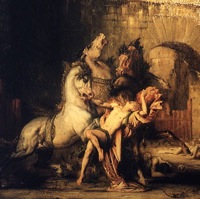Conceit
From Nordan Symposia
Revision as of 17:28, 16 March 2011 by Rdavis (talk | contribs) (Created page with 'File:lighterstill.jpgright|frame ==Origin== [http://nordan.daynal.org/wiki/index.php?title=English#ca._1100-1500_.09THE_MIDDLE_ENGLIS...')
Origin
Middle English, from Anglo-French, from conceivre
Definitions
- 1a (1) : a result of mental activity : thought (2) : individual opinion
- b : favorable opinion; especially : excessive appreciation of one's own worth or virtue
- 2: a fancy item or trifle
- 3a : a fanciful idea
- b : an elaborate or strained metaphor
- c : use or presence of such conceits in poetry
- d : an organizing theme or concept <found his conceit for the film early — Peter Wilkinson>
Description
In literature, a conceit is an extended metaphor with a complex logic that governs a poetic passage or entire poem. By juxtaposing, usurping and manipulating images and ideas in surprising ways, a conceit invites the reader into a more sophisticated understanding of an object of comparison. Extended conceits in English are part of the poetic idiom of Mannerism, during the later sixteenth and early seventeenth century.
